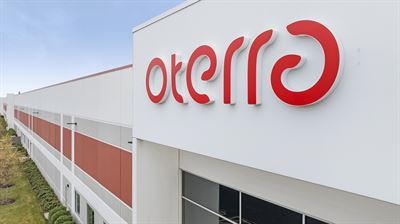
MOUNT PLEASANT, WI., Dec. 4, 2024 — Oterra, a leader in natural colors for the food and beverage sector, is building on its capabilities in the US with a state-of-the art innovation, collaboration, and production hub in Mt. Pleasant, WI.
The 155,000 sq ft (14,400 m2) US Headquarter combines Oterra’s innovation and application labs with a new manufacturing and logistics facilities to meet the expected growth of natural colors and coloring foodstuffs in the country.
“The new facility is a direct commitment to the US market,” says Oterra CEO Martin Sonntag. “Oterra already has a strong foothold in the North American market, catering to the demands of an environmentally conscious and health-focused consumer base. This puts Oterra in a great position to further support our customers in the conversion towards natural colors.”
Customers and partners can work directly with Oterra’s team of regulatory and application experts to find the perfect natural shade as they innovate and develop new products or reformulate with natural colors to help deliver on consumer demands faster.
A further 40,000 sq ft of expansion space is available for new color products and partner pilot production lines.
Consumer demand for natural colors
The Natural Colors Association (NATCOL) released a study in May[1] that looked at US consumer perceptions on natural food colors and the extent of which they were accepting different food colorings and how it influenced their purchasing decisions.
The appearance of food and beverage was ranked top five among consumers, while the specific awareness of color was lower compared to other components like taste, price, protein content, sugar content. There was, however, a significant preference for natural colors where 7 out of 10 consumers accepted natural coloring in their food and beverage and expressed positive connotations like ‘healthy’, ‘safe’, ‘good’, ‘sustainable’ and ‘appealing’ in products containing them.
Since color in the US is only labeled as ‘added color’ US consumers had difficulty understanding what natural colors are, but when explained, they were encouraged by claims that promised the presence of natural colors.
“We have observed notable shifts in consumer demand, primarily fueled by an increasing focus on health and wellness,” says Chari Rai, Head of Applications, North America.
“Consumers are becoming more informed and intentional about the choices they make, seeking products that align with their desire for healthier lifestyles. This trend extends beyond just nutritional value to include cleaner labels, natural ingredients, and sustainable sourcing. Additionally, regulatory changes in certain states are expected to further accelerate the demand for products that limit or eliminate the use of artificial dye.
“Oterra prides itself on making natural colors easy for customers and the opening of the new facility will help us fulfill that promise. Besides having the widest range of natural products, we can offer our customers world-class R&D and application labs, hands-on training, and team inspiration events that can help food and beverage companies stand out in the market.”
[1] NATCOL US Consumer Food and Beverage Colors Attitudes Study, 2024. Natural colors are defined as (e.g., fruit or vegetable juice for color, beta-carotene) derived from plants, animals, minerals, or other natural sources and hence the pigments are those natural occurring in such sources.
For more information and images:
Andrew Arnold
Head of Communications
Tel: + 45 52 28 20 50
andrew.arnold@oterra.com
Oterra is the largest provider of naturally sourced colors worldwide. Since our first color launch in 1876, we’ve utilized the power of nature’s true colors and championed that natural is best. We continue to share our unrivalled expertise in colors for food, beverage, dietary supplements and pet food to help manufacturers bring appealing products to consumers around the world. And we continue to empower our partners to meet demand for safe, sustainable and natural food on our journey together towards natural.
Denmark-based Oterra has two plants in the US employing around 130 people. It has been present on the US market since its first natural color launch in 1876 at the World Exhibition in Philadelphia.
www.oterra.com
Tags:

